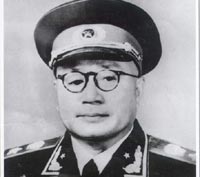Liu Bocheng
"When I die, it would be my greatest honor if my gravestone was inscribed with 'Chinese Bolshevik Liu Bocheng,'" said Liu Bocheng on his 50th birthday in 1942. Liu is one of China's ten marshals.
Liu was born to a poor family in Kaixian County, Sichuan Province, on December 4, 1892. In May 1926, Liu joined the Communist Party of China. In December 1926, Liu masterminded the Luzhou and Nanchong uprisings and fought against local warlords while supporting the Northern Expedition. Showing unswerving loyalty to the CPC, Liu fought arduously to build up the people's army.
During the Long March, near the end of 1934, Liu was appointed as Chief of the General Staff of the Red Army and Commander of Central Column, which consisted of the majority of the CPC senior leaders. Bo Gu, Zhou Enlai and Mao Zedong were also a part of this group. Liu led the army across the Wu River and took control of Zunyi, a county in Guizhou Province. It was in this small city that the famous Zunyi Conference was held in January 1935. During this conference, Liu and most of the attendees showed their support for Mao.
Later on, Liu assisted Mao and Zhu across the Red Water River four times. Liu led troops in the takeover of the Jiaopin ferry, securing the route across the Jinsha River for the troops. In May, Liu was appointed commander of the avant-courier army and worked with Commissar Nie Rongzhen to secure the route for the remaining troops. After that, Liu led the 1st Division of the Red Army successfully across the Dadu River.
During the Anti-Japanese War, Liu and Deng Xiaoping led their troops to northern China, where they carried out bush fighting. After rounds of successful battles against the Japanese army, they set up the Jinjiluyu Base Area, which consisted of parts of Shanxi, Hebei, Shandong, and Henan provinces. This significantly enhanced the People's armed forces.
During the Liberation War, Liu's army promptly moved south and went into the Dabie Mountain area, imposing severe impact to Kuomintang's tottering rein.
As a battle-scarred commander, Liu was injured more than nine times, and lost one eye.
Toward the end of 1950, Liu was transferred to Nanjing as president and commissar of the Military Academy of the PLA. In 1955, Liu attained the rank of field marshal, ranking 4th out of 10 field marshals in the PLA, next to Zhu De, Peng Dehuai and Lin Biao.
